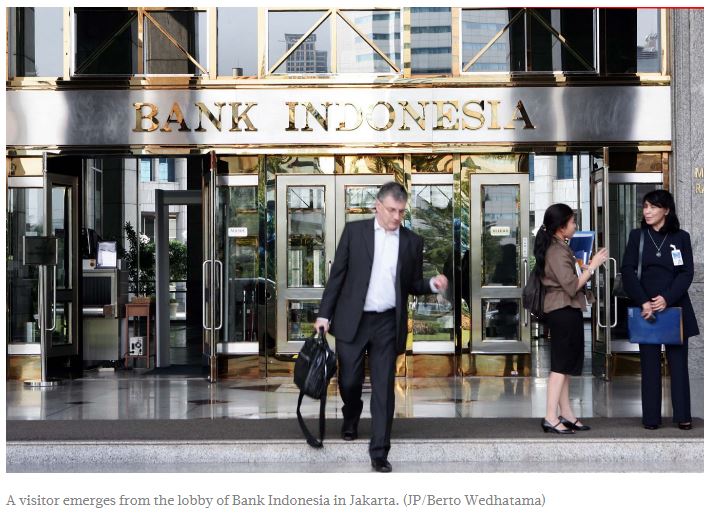Indonesia: Financial sector overhaul could harm BI’s independence, economists warn
The possible amendments to the 1999 and 2004 Bank Indonesia (BI) Laws and the issuance of a regulation in lieu of law (Perppu) on financial system reform may interfere with the central bank’s independence, economists have warned.
In a virtual discussion held by the Institute for Development of Economics and Finance (Indef), the institute’s senior economist M. Fadhil Hasan said the central bank’s independence would need to be strengthened along with the plans to expand its mandate, as opposed to being compromised.
“Precisely because the responsibilities are getting bigger, it is necessary to strengthen the institution of BI, and in fact, its independence must be strengthened,” Fadhil said during the discussion on Thursday.
The government has declared its intention to reform the country’s financial system in recent months. The Finance Ministry announced in late August that the government was planning on issuing a Perppu to reform the financial system. That was followed by a bill proposed by the House of Representatives in early September to amend BI Laws.
The bill would render the central bank in charge of all banking industry supervision, taking the responsibility away from the Financial Services Authority (OJK), while also expanding the central bank’s mandate to include driving the country’s economic growth and creating sustainable employment. According to the prevailing laws, the central bank’s main task is to maintain the stability of inflation and the rupiah’s exchange rate.
Aside from that, the bill would also warrant the installation of a monetary board led by the finance minister, who could vote in monetary policy decisions. At present, BI is obliged to reject and ignore any kind of intervention from any entity.
“What necessitates the macroeconomic policy board? There needs to be a more in-depth study, so that there are no overlaps,” Diponegoro University economics professor FX Sugiyanto said, noting that the Financial System Stability Committee (KSSK) had already addressed the need for better coordination between state agencies running the financial department.
The KSSK consists of the finance minister, BI governor, OJK chairman, as well as the Deposit Insurance Corporation (LPS) chairman.
Finance Minister Sri Mulyani Indrawati pledged on Sept. 4 that the government would ensure a credible and independent central bank to maintain stability and market trust. Monetary policy must “remain credible, effective and independent” going forward, the minister stressed, reiterating President Joko “Jokowi” Widodo’s statement on Sept. 1.
“What is important is that we make every effort to reduce the abuse of power,” Indef senior economist Faisal H Basri said during the discussion on Thursday. Faisal signaled his concern over the possibility of the government utilizing the central bank to resolve state firms’ financial problems, as an example of a breach of power.
He went on to say that, as a matter of fact, there were already members of BI and the Finance Ministry within the OJK, thereby addressing the issue of coordination between institutions.
Meanwhile, Fithra Faisal Hastiadi, executive director at think tank Next Policy, questioned the plan of shifting the mandate of banking supervision from the OJK to BI.
He explained that the financial sector had been undergoing significant developments that required the central bank to have “an extra hand on deck” to help supervise the developments.
“Why should we change course when we are already on the right track?” Fithra asked. Along the same lines, he added that Indonesia’s financial sector was not in a state that required an urgent revision of the 1999 BI Law. Improvements in coordination between institutions could be done through other means, he said.
A central bank’s independence is deemed necessary for countries to have a financial institution with a long-term approach that is protected from politicians’ short-term interests in policy-making, experts have said.
Meanwhile, regarding the Perppu draft, Indef deputy director Eko Listiyanto noted that the protracted discourse on the reform was rather unproductive for the financial sector.
“I think that this draft needs to be circulated immediately among the public so that it will not become counterproductive,” Eko told the audience, saying that while the legislative body was drafting the amendments, it was still unclear what the Perppu was going to look like.
Source: https://www.thejakartapost.com/news/2020/10/05/financial-sector-overhaul-could-harm-bis-independence-economists-warn.html


 English
English




